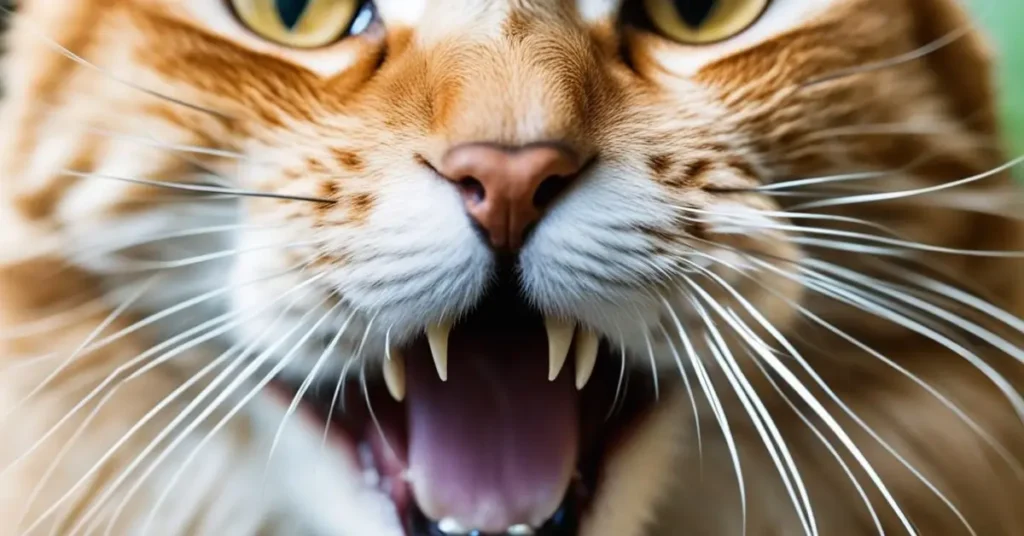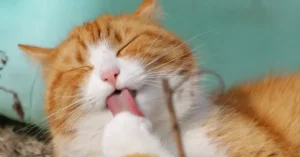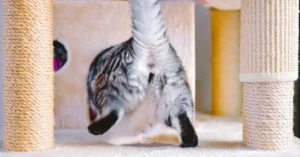Taking care of our furry friends includes not just feeding them and giving them a safe place to live, but also ensuring they have good dental hygiene. Cat dental health is an essential topic that all cat owners should be aware of. In these introductory paragraphs, we’ll briefly discuss its importance and how to maintain it.
Cats, just like humans, can develop a range of dental issues such as gingivitis, periodontitis, and tooth resorption. These conditions can cause pain and discomfort, severely affecting the overall quality of life for our beloved pets. To prevent these problems and keep our cats healthy and happy, we should pay attention to cat dental health.
By learning more about cat dental health, we’ll be better equipped to establish routines and habits to keep our feline friends’ teeth clean and gums healthy. Knowledge about dental care for cats is vital for their well-being and ensures we’re providing them with the best possible care.
Understanding the Importance of a Cat’s Dental Health
When it comes to our beloved feline friends, cat dental health is a vital aspect that is often overlooked. Maintaining proper oral care for our cats is essential to their overall well-being and happiness.
Did you know that 70 percent of cats show signs of oral disease by the age of 3? Dental issues can greatly impact a cat’s appetite, leading to weight loss and other associated health conditions. It’s our responsibility as pet owners to monitor and maintain the dental health of our feline companions.
A cat dental chart is an invaluable tool that can help us keep track of our cat dental health. This comprehensive record, maintained by the veterinarian, lists all of our cat’s teeth and any associated dental problems. Regular check-ups and updates to the chart can assist in early detection and prevention of dental issues.
Dental diseases, such as gingivitis, can cause serious discomfort and pain for our furry friends. Gingivitis is a condition where the gums around the teeth become inflamed, red, swollen, and painful. If left unchecked, dental disease can lead to your cat stopping eating, which can result in numerous health problems.
To avoid these issues, we need to pay attention to our cat dental health. This includes regular teeth cleanings, dental checkups with the vet, and providing them with a healthy diet that supports oral hygiene. Overall, being proactive about our cat’s dental health will significantly contribute to a happy and healthy life for our furry family members.
Proper Brushing Techniques for Cats
Maintaining your cat dental health is essential for their overall well-being. In this section, we’ll cover some proper brushing techniques that can help keep your cat’s teeth clean and healthy.
Choosing the Right Toothbrush
When it comes to selecting a toothbrush for your cat dental health, it’s essential to choose one specifically designed for cats. These brushes are smaller than human toothbrushes and come with softer bristles that ensure a gentle and comfortable brushing experience. Some cat toothbrushes even have a finger-tip design, allowing you to easily access and massage your cat’s gum line.
Selecting the Appropriate Cat Toothpaste
Just as with toothbrushes, it’s crucial to pick the right toothpaste for your feline friend to maintain their cat dental health. Human toothpaste contains ingredients that can be toxic to cats, so be sure to use toothpaste specifically formulated for cats. These toothpastes are safe to swallow and are available in various flavors, such as poultry or fish, making the experience more enjoyable for your cat. Regular brushing with cat-specific toothpaste is an important part of their dental care routine.
Some key features to consider when selecting a cat toothpaste include:
- Enzymatic properties: Enzymatic toothpastes can help break down plaque and tartar build-up
- Flavor: A tasty flavor your cat enjoys will make the brushing process easier
- Safety: The toothpaste should be non-toxic and safe for your cat to swallow
Optimal Brushing Frequency
To ensure your cat dental health, it’s recommended to brush their teeth daily. However, if daily brushing is not feasible, aim to brush their teeth at least a few times a week. By doing so, you’ll help prevent the build-up of plaque, keeping your cat’s teeth healthy and their breath fresh.
Consistency is key when it comes to maintaining your cat’s dental hygiene. Establish a routine that works for you and your furry companion, and try to stick with it to ensure their teeth stay clean and healthy.
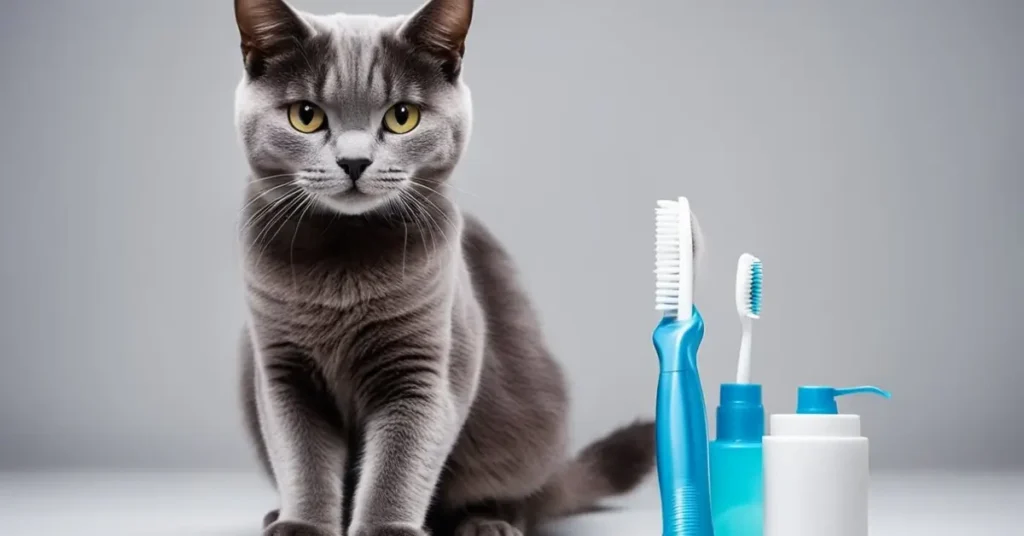
Recognizing Common Problems in Cat Dental Health
As cat owners, maintaining our furry friends’ overall health is essential, and that includes their dental health. In this section, we’ll discuss common dental problems in cats and their symptoms to help you identify any issues your cat may be experiencing. Taking proactive steps to ensure good cat dental health is crucial for their well-being.
Tooth Decay
Tooth decay in cats can occur when bacteria and plaque build up on their teeth, leading to cavities and other dental issues. Some symptoms to look out for include:
- Bad breath
- Discolored or damaged teeth
- Dropping food from the mouth
- Chewing on one side of the mouth
- Excessive drooling
If you notice any of these signs in your cat, it’s crucial to consult your veterinarian for proper diagnosis and treatment.
Gum Diseases
Gum diseases, such as gingivitis and periodontal disease, are quite common in cats. These conditions start with the inflammation of the gums and can progress, leading to severe pain and tooth loss. Keep an eye out for the following symptoms:
- Swollen or bleeding gums
- Bad breath
- Pawing at the mouth
- Difficulty eating or chewing food
Early detection of gum diseases is important to prevent further complications. Regular checkups with your veterinarian can help ensure your cat’s gums remain healthy.
Oral Cancer
Though less common than tooth decay and gum diseases, oral cancer can occur in cats, and it’s critical to catch it early for the best possible outcome. Some symptoms of oral cancer in cats include:
- Swelling or lumps in the mouth or jaw
- Persistent bad breath
- Unexplained weight loss
- Difficulty eating or swallowing
- Excessive drooling, possibly with blood
If you suspect your cat may have oral cancer, contact your veterinarian immediately for proper diagnosis and treatment options.
By staying informed about these common cat dental health issues and their symptoms, we can help our feline friends lead happier, healthier lives. Regular veterinary care and proper oral hygiene practices at home are essential for preventing and treating dental problems in cats.
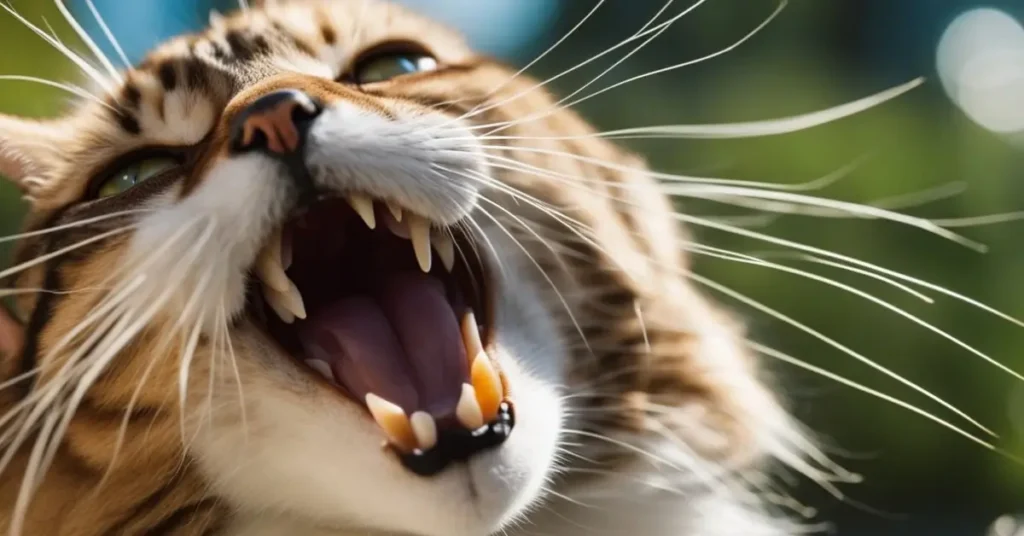
Professional Teeth Cleaning and Check-ups
Taking care of your cat dental health is crucial for maintaining their overall well-being. Regular home care, along with professional teeth cleaning and check-ups at the vet, are essential for cat dental health. The cost of a standard dental cleaning for a cat typically ranges between $50 and $300, depending on the condition of their teeth and the veterinary practice.
However, the average overall cost for a feline dental cleaning at a vet clinic is around $300-$750. This fee usually covers the physical exam, pre-anesthetic blood work screening, anesthesia, dental X-rays, and the cleaning procedure itself. In some cases, if tooth extractions or additional treatments are necessary, the costs may exceed $1,000.
During a professional teeth cleaning, your cat’s veterinarian will carefully remove plaque and tartar buildup, while also inspecting for any signs of dental disease or tooth damage. Dental diseases in cats can cause pain, infection, and potentially lead to serious health issues if left untreated. That’s why we strongly recommend scheduling annual check-ups and cleanings to ensure your cat’s dental health and overall well-being.
Here are a few reasons why professional teeth cleaning and check-ups are beneficial for your cat:
- Early detection of dental issues: Regular check-ups can help your veterinarian identify any dental problems before they become severe and require extensive treatment.
- Prevention of bad breath and tooth loss: Cleaning removes plaque and tartar, which helps prevent gum disease and tooth loss, keeping your cat’s breath fresh.
- Improved overall health and comfort: Dental issues can lead to pain, difficulty eating, and infection, which can impact your cat’s overall health. Timely check-ups and cleanings can help address these issues early on.
In summary, regular professional teeth cleaning and check-ups are an important aspect of maintaining your cat dental health. By combining these services with at-home preventive care, you will be ensuring the health and happiness of your feline friend while avoiding expensive procedures in the future.
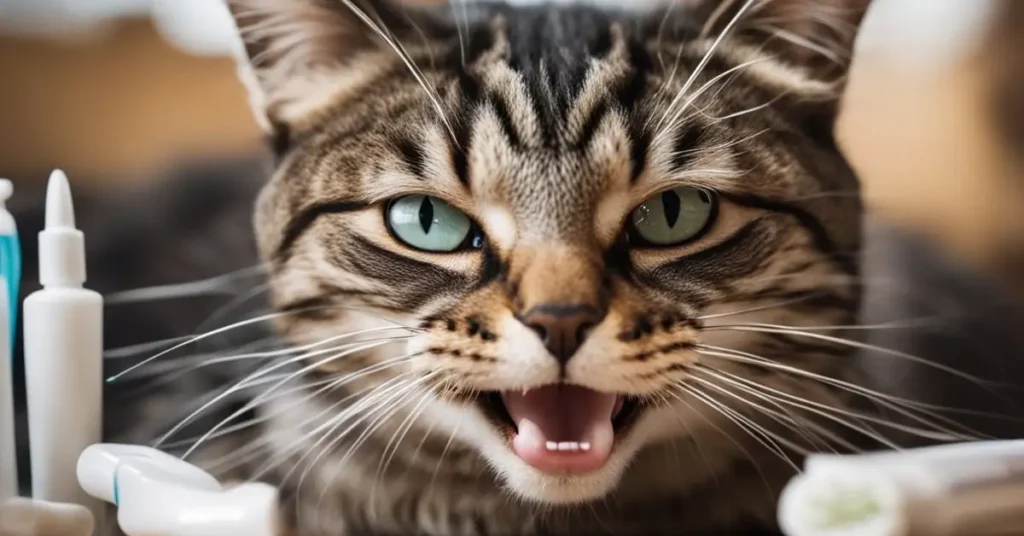
Ways to Promote Good Dental Health
As pet owners, it’s our responsibility to ensure our cats maintain their overall well-being, which includes cat dental health. In this section, we will discuss some effective ways to promote good dental health for your feline friends.
Healthy Dental Diet for Cats
A key component to maintaining your cat dental health is a balanced and nutritious diet. Speak with your veterinarian about the ideal food for your cat’s overall and dental health. Certain prescription diets are made especially to help enhance the dental health of cats with dental disease or other oral health issues.
Cat Dental Health Treats
Incorporating dental health treats specifically designed for cats can be beneficial in promoting their dental hygiene. These treats typically have a texture that helps remove plaque and tartar buildup. Choose treats that have been approved by the Veterinary Oral Health Council, as they meet specific standards for reducing oral bacteria and plaque buildup.
Interactive Chewing Toys
Another way to improve your cat’s dental health is by providing them with safe and appropriate chewing toys. These interactive toys encourage cats to chew and play, which helps stimulate their gums and clean their teeth in the process. When selecting toys, make sure they are suitable for your cat’s size and chew strength to avoid any choking hazards or damage to their teeth.
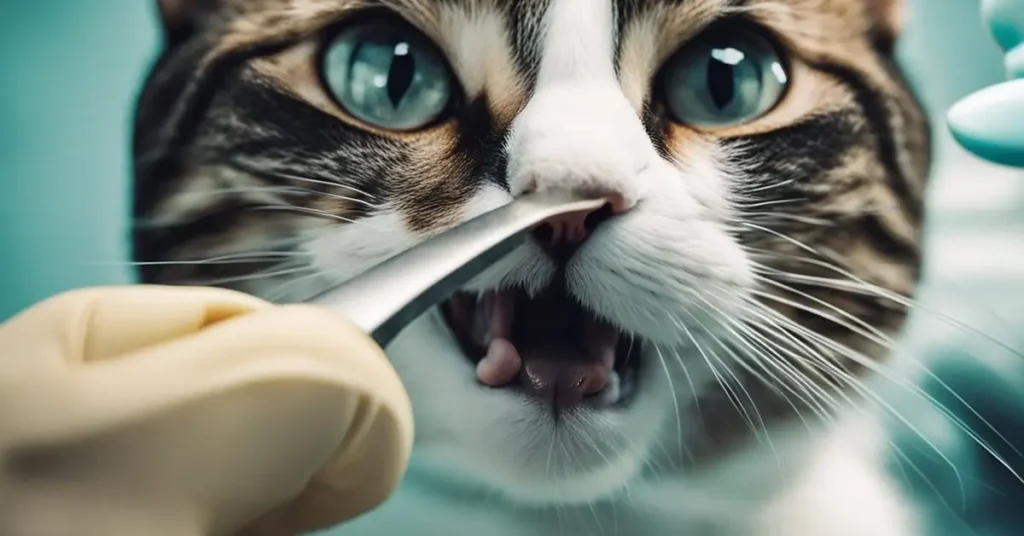
Signs Your Cat Needs Dental Help
As pet owners, we need to be attentive to our furry friends’ needs, particularly when it comes to their health. Cat dental health is an essential aspect that shouldn’t be neglected, as it can lead to serious issues if left uncared for. In this section, we’re going to discuss the signs that indicate your cat may need dental help.
One common sign of dental problems in cats is bad breath. While it’s normal for a cat’s breath to have a slight odor, a persistent and foul smell could suggest an underlying issue, such as gingivitis or periodontal disease. If you notice a change in your cat’s breath, it’s crucial to consult with a veterinarian to identify the root cause.
Another indication of dental health issues is a change in your cat’s eating habits. If your cat is experiencing dental pain, they may become hesitant to eat or favor one side of their mouth while chewing. Moreover, they might also drop food from their mouth or prefer softer food items. Dental pain can be caused by various factors, including tooth resorption, gum disease, or oral tumors.
Additionally, pay attention to any behavioral changes in your cat, such as excessive pawing at the mouth, drooling, or showing signs of discomfort while eating. These can be indicative of dental issues that need to be addressed. It’s essential to monitor your cat’s behavior and consult with your veterinarian if you observe anything unusual.
It’s crucial to maintain your cat dental health by implementing a regular dental care routine, including brushing your cat’s teeth and providing dental-friendly toys and treats. By being attentive to these signs and taking care of your cat’s dental health, you’ll help your feline companion lead a healthier and happier life.
Preventing Future Dental Issues in Cats
As cat owners, we understand the importance of maintaining our feline friend’s dental health. In this section, we will discuss some essential steps to take in preventing future dental issues in cats. One crucial aspect of cat dental health is regular brushing.
Just like us, cats need their teeth brushed to remove plaque and tartar buildup. Ideally, we should brush our cat’s teeth daily, but a minimum of three times per week is also acceptable. Using a specially designed cat toothbrush and toothpaste can help make this process more manageable and enjoyable for both you and your cat.
Providing dental chews and toys for our cats can also play a significant role in maintaining their dental health. These items can help to clean their teeth and massage their gums as they chew. Look for dental chews and toys specifically designed for cats, as they often contain enzymes that can aid in the prevention of plaque and tartar buildup.
Another essential step we can take for our cat dental health is scheduling regular veterinary checkups. Cats should have a professional dental cleaning performed by a veterinarian every 1-2 years or more often if they have a history of dental disease. Our vet can also diagnose any possible dental issues early on, leading to more effective treatment plans and improved long-term health for our cats.
Lastly, it’s essential to pay attention to any changes in our cat’s eating habits or behavior. If they are reluctant to eat, dropping food from their mouth, or showing signs of pain while eating, it could be an indication of an underlying dental issue. In such cases, it’s vital to visit a veterinarian as soon as possible to avoid any long-term harm to our cat’s health.
By following these preventive measures, we can help ensure that our feline companions maintain good dental health and avoid potential complications in the future. #catdentalhealth
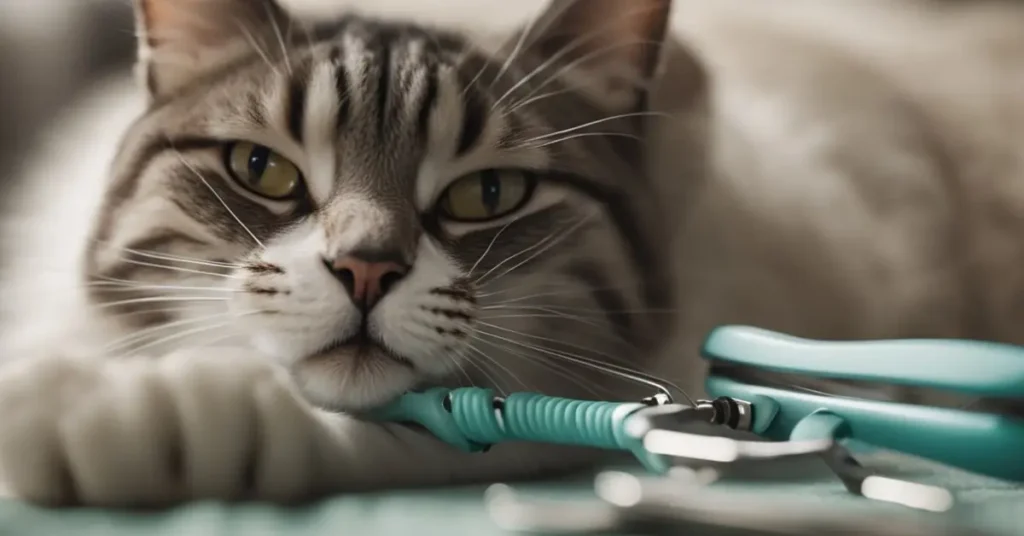
Our Thoughts About Cat Dental Health
As cat owners, it’s our responsibility to take care of our furry friends’ overall health, and that includes their dental health. Cat dental health is an essential aspect of their well-being that many people may overlook. In this section, we will discuss the importance of cat dental health and some common dental problems that cats can face.
Cats, like humans, can suffer from various dental issues such as gingivitis, periodontitis, and tooth resorption, which can affect their cat dental health. Dental disease in cats can cause serious pain and discomfort, impacting their quality of life. One of the most common indicators of dental issues is bad breath or halitosis, indicating the need for cat dental health care. Other signs of dental problems in cats include pawing at their mouth, jaw chattering, and having difficulty eating.
It’s crucial to schedule regular dental check-ups for your cats to maintain their cat dental health and prevent any potential issues. A standard dental cleaning for cat dental health may cost between $50 and $300, depending on your cat’s age and dental condition. Older cats are more likely to have extensive plaque and tartar buildup, making the cleaning process more time-consuming and potentially more expensive.
In addition to professional cleanings, we can also help our cats maintain good dental hygiene by brushing their teeth regularly. Introducing tooth brushing at an early age can make it easier for both you and your cat to develop this healthy habit. It’s also essential to keep an eye out for the warning signs of dental disease in your cat, such as missing or loose teeth, visible tartar, bleeding, swollen, or red gums.
Enhancing our cat’s dental health not only leads to a happier, more comfortable life for our feline friends but also helps prevent more severe dental problems in the future. So let’s prioritize our cats’ dental care to ensure our loving companions enjoy a healthy and pain-free life.
FAQ Cat Dental Health
What can I give my cat for dental health?
There are several options you can consider to promote your cat’s dental health. Dental cat treats are available that can help reduce plaque and tartar buildup while satisfying their need to chew. You may also consider offering them cat dental chews specifically designed to clean teeth and massage gums. Additionally, a water additive for dental health can be added to their drinking water to reduce bacteria and freshen their breath.
How can I improve my cat’s dental hygiene?
Here are some steps to improve your cat’s dental hygiene:
Brush your cat’s teeth regularly: Start by gradually introducing toothpaste made for cats and a soft-bristled toothbrush, then brush their teeth once or twice a week.
Feed them dental-friendly food: Some specially formulated dental cat food can help remove plaque and tartar. Consult your vet for recommendations.
Schedule regular vet checkups: It is essential to take your cat for routine dental checkups with their veterinarian to spot any issues early and ensure proper dental care.
Your cat will need time to adjust to new dental care routines, so introducing these changes slowly and with patience can make a significant difference in maintaining their dental health.
Do I need to do anything for my cat’s teeth?
ording to the American Veterinary Medical Association, by age 3, most cats show early signs of periodontal disease, which can worsen if not addressed. Preventive measures you can take include:
Regularly brushing your cat’s teeth
Offering dental friendly food and treats
Scheduling routine dental checkups with a veterinarian
By taking an active role in your cat’s dental health, you can help prevent issues like gum disease, tooth decay, and bad breath, keeping your cat happy and healthy.
You are also interested in more health care for your feline friend? So have a look at our article about cat health care.
What are your thoughts about cat dental health? Let us know in the comments 🙂

